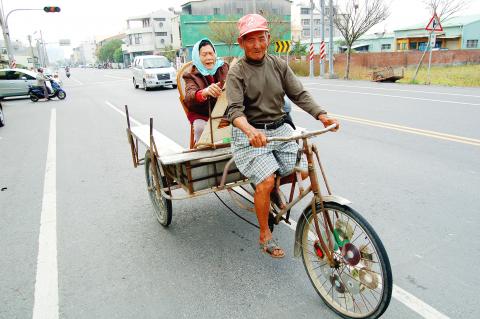An 82-year-old farmer from Sinying District (新營), Greater Tainan, has been pedaling 6km to the city center on a tricycle for the past 18 years so that his wife could receive medical treatment.
Chao Shen Chin-liu (趙沈金柳), 78, has walking disabilities resulting from spinal surgery, a condition that is exacerbated by her age, and is unable to ride on a motorcycle.
In light of this, her husband, Chao Shui-sheng (趙水盛), takes her to a downtown clinic — 6km there and 6km back — whenever she needs medical treatment.

Photo: Yang Chin-cheng, Taipei Times
To enhance traffic safety as he escorts his wife, Chao Shui-sheng has placed several CDs on his tricycle’s front wheel as reflectors, along with a warning triangle reflector. Aside from this, a wicker chair was installed on the back for his wife to sit on.
Pedaling 12km may seem to be an easy task for people in good physical condition, but Chao Shui-sheng is in his 80s and has a disability certificate because of poor vision in his right eye, and weak vision in his left — so much so that everything beyond 5m is a blur.
Despite the physical barriers, Chao Shui-sheng said he did not feel tired from his long-distance pedaling.
On the couple’s cycling route to the clinic, the husband occasionally glances back to check on Chao Shen Chin-liu seated behind him. Upon their arrival at the clinic, Chao Shui-sheng reverses his tricycle to the front entrance, then lends a hand to his wife as she dismounts and proceeds into the clinic with a walking stick.
“Grandpa is very thoughtful so that grandma can have the chance to get some air outside. Remember to treat him nicely,” nurses at the clinic said to Chao Shui-sheng’s wife, adding the elderly couple share a close connection.
“So long as I can move, and can cycle, I will keep on pedaling my tricycle to transport my wife,” Chao Shui-sheng said, with the 78-year-old wife expressing gratitude to her husband for taking care of her during their 60 years of marriage.
Cho Chun-mou (周俊牟), a resident of Sinying’s Piliao Borough (埤寮), said the couple’s lifelong dedication to one another could serve as an inspiration and example to others amid the high divorce rate in Taiwanese society.
Translated by Stacy Hsu, staff writer

The manufacture of the remaining 28 M1A2T Abrams tanks Taiwan purchased from the US has recently been completed, and they are expected to be delivered within the next one to two months, a source said yesterday. The Ministry of National Defense is arranging cargo ships to transport the tanks to Taiwan as soon as possible, said the source, who is familiar with the matter. The estimated arrival time ranges from late this month to early next month, the source said. The 28 Abrams tanks make up the third and final batch of a total of 108 tanks, valued at about NT$40.5 billion

Travel agencies in Taiwan are working to secure alternative flights for travelers bound for New Zealand for the Lunar New Year holiday, as Air New Zealand workers are set to strike next week. The airline said that it has confirmed that the planned industrial action by its international wide-body cabin crew would go ahead on Thursday and Friday next week. While the Auckland-based carrier pledged to take reasonable measures to mitigate the impact of the workers’ strike, an Air New Zealand flight arriving at Taipei from Auckland on Thursday and another flight departing from Taipei for Auckland on Saturday would have to

A group from the Taiwanese Designers in Australia association yesterday represented Taiwan at the Midsumma Pride March in Melbourne. The march, held in the St. Kilda suburb, is the city’s largest LGBTQIA+ parade and the flagship event of the annual Midsumma Festival. It attracted more than 45,000 spectators who supported the 400 groups and 10,000 marchers that participated this year, the association said. Taiwanese Designers said they organized a team to march for Taiwan this year, joining politicians, government agencies, professionals and community organizations in showing support for LGBTQIA+ people and diverse communities. As the first country in Asia to legalize same-sex

MOTIVES QUESTIONED The PLA considers Xi’s policies toward Taiwan to be driven by personal considerations rather than military assessment, the Epoch Times reports Chinese President Xi Jinping’s (習近平) latest purge of the Chinese People’s Liberation Army (PLA) leadership might have been prompted by the military’s opposition to plans of invading Taiwan, the Epoch Times said. The Chinese military opposes waging war against Taiwan by a large consensus, putting it at odds with Xi’s vision, the Falun Gong-affiliated daily said in a report on Thursday, citing anonymous sources with insight into the PLA’s inner workings. The opposition is not the opinion of a few generals, but a widely shared view among the PLA cadre, the Epoch Times cited them as saying. “Chinese forces know full well that